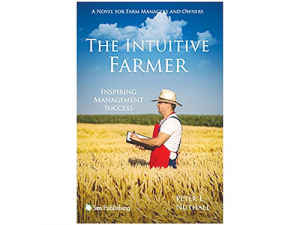Wired for Science: Understanding the feeding habits of mealybug
Fussy children might be frustrating, but fussy mealybugs could help protect the New Zealand wine industry from grapevine leafroll-associated virus 3.
 The research examines how farmers make their decisions, the role intuition plays and how it can be improved.
The research examines how farmers make their decisions, the role intuition plays and how it can be improved.
A Lincoln University researcher investigating the role of intuition in farmers’ decisionmaking has had his work published in a scientific journal and as a novel.
Dr Peter Nuthall and Dr Kevin Old, from the department of land management and systems, have been examining how farmers make their decisions, the role intuition plays and how it can be improved.
Their analysis of farmers’ intuitive decisionmaking is published in Journal of Rural Studies (‘Intuition, the farmers’ primary decision method. A review and analysis’), and Nuthall has published a novel on the same theme.
His novel, The Intuitive Farmer: Inspiring Management Success, tells of a group of farmers who meet to discuss management challenges and skills associated with intuition. Guided by meeting facilitators, the farmers sort out each other’s decision problems, learning and taking on board the lessons. And a new novel will guide farmers through the process of modifying their management style.
The book is available through most international online book sellers, including its publisher 5M.
Nuthall and Old gathered data from at least 700 farmers.
“Farmer intuition has never been analysed to this extent before,” said Nuthall.
The research showed that farmers base most decisions on their intuition. They do not formally analyse each decision but use their mental powers to decide what to do.
“Sometimes a decision is instantaneous, but in others a range of thought levels are brought to bear before acting. Good decision intuition is not a mysterious process,” said Nuthall.
“Profit and other assessments show some farmers are good intuitive decisionmakers, others not so good.”
Farmers with little experience, whether or not they are naturally intuitive, found it difficult to make good decisions.
Nuthall said the intuition process often uses ‘pattern matching’, in which the brain uses experience to match past events with a current problem requiring a decision.
“The farmer [then intuitively] comes up with what the brain believes to be the correct action.”
However, intuition was more than just pattern matching.
“Intuition develops with a farmer’s thought process, self-criticism and review.”
The new research showed how farmers can improve their intuition, he says.
Recent weather events in the Bay of Plenty, Gisborne/Tairawhiti, and Canterbury have been declared a medium-scale adverse event.
DairyNZ's chief executive Campbell Parker says the 2024/25 dairy season reinforces the importance of the dairy sector to New Zealand.
A New Zealand agribusiness helping to turn a long-standing animal welfare and waste issue into a high-value protein stream has won the Australian dairy sector's top innovator award.
OPINION: A bumper season all around.
Dairy Women's Network (DWN) has announced that Taranaki dairy farmer Nicola Bryant will join its Trust Board as an Associate Trustee.
Rural Women New Zealand (RWNZ) says it welcomes the release of a new report into pay equity.
OPINION: Staying with politics, with less than nine months to go before the general elections, there’s confusion in the Labour…
OPINION: Winston Peters' tirade against the free trade deal stitched with India may not be all political posturing by the…